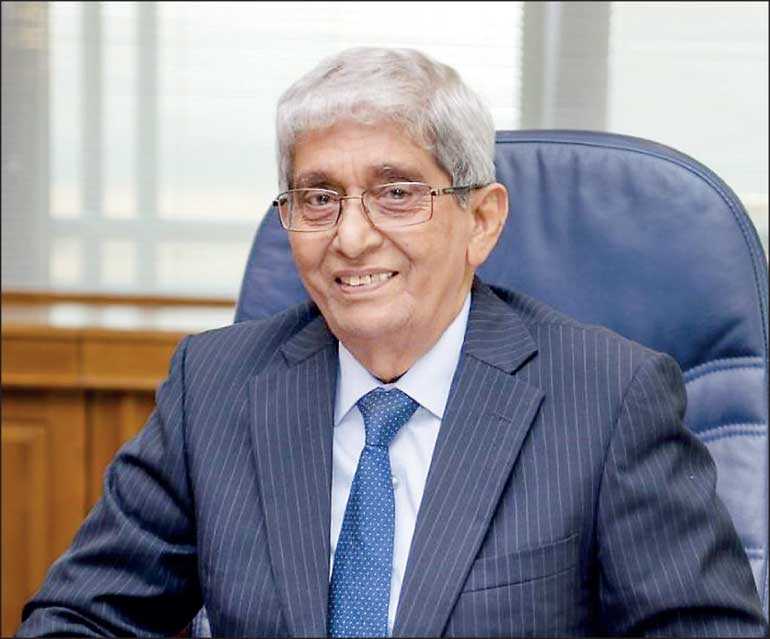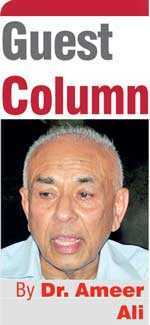Monday Feb 16, 2026
Monday Feb 16, 2026
Saturday, 17 April 2021 00:05 - - {{hitsCtrl.values.hits}}

Experts are warning already that the controversial Colombo Port City would be a magnet for attracting unsavoury financial activities and shady economic deals, which would adversely affect Government revenue and real national economy. Would the esteemed Central Bank Governor Prof. W.D. Lakshman guarantee that this would not happen? If he cannot, it would only show that he too has succumbed to pressures from his political masters
 The Governor of the Central Bank, Prof. W.D. Lakshman, a trained economist, respected academic and a proud colleague of mine at Peradeniya, stated sometime back that President NGR’s promise of prosperity and splendour would be delivered through an “alternative and novel” path of development, without giving much details about it. However, from his subsequent interviews to the media and public speeches one could gather some sign posts of that heavenly path.
The Governor of the Central Bank, Prof. W.D. Lakshman, a trained economist, respected academic and a proud colleague of mine at Peradeniya, stated sometime back that President NGR’s promise of prosperity and splendour would be delivered through an “alternative and novel” path of development, without giving much details about it. However, from his subsequent interviews to the media and public speeches one could gather some sign posts of that heavenly path.
The Governor’s or more appropriately his master NGR’s development model is based on a bundle of thought bubbles, which in economic parlance, would translate into guaranteeing adequate liquidity through printing money to facilitate market-based economic activities and transactions, low interest rates to encourage domestic investment, ad hoc import substitution measures, affirmative action to encourage domestic production especially in agriculture, and above all, not to seek assistance from IMF.
That strategy might have been the need of the time when the world economy was hit by COVID-19 and countries were desperately taking steps at least to maintain the pre-pandemic status quo. However, while the world economy seems to be on a slow recovery path, maintaining the same strategy at home, without introducing structural changes to the economy to favour the most productive sectors, may worsen rather than improve people’s lives.
Already, the alternate path has driven down the value of domestic currency, increased prices of consumer essentials, created supply constraints for local manufacturers, reduced government revenue, and brought down the level of foreign reserves to a historic low.
In the meantime, with debt obligations looming large during the current year, Prime Minister MR and his State Minister for Money, Capital, Market and Public Enterprise Reforms Ajith Nivard Cabraal (ANC), have flown to Bangladesh and Oman respectively, in search of credit assistance, either through currency swaps or loans.
There is nothing novel about this except the two countries they have approached now are Muslim. Bangladesh, until recently, was a textbook case of Third World poverty and misery, but has performed admirably well by the optimal utilisation of its cheapest resource, population. While the other, Oman, which was historically rural and agrarian, because of petroleum bonanza has emerged from a fishing village into a capital surplus economic megalith.
There is a lot to learn from the experience of Bangladesh in the utilisation of human resource. One cannot expect Sri Lanka to perform well economically when its human resources are used sub-optimally because of ethno-national politics,
While MR and ANC are looking for friendly Muslim nations for loans and currency swaps, back at home, President NGR, who is also the Minister of Defence, and Retired Admiral Sarath Weerasekera, the Minister of Public Security, are busy making the entrepreneurial Muslim community a scapegoat for the 2019 Easter Sunday massacre, while allowing those who masterminded, financed, enabled and executed that horror go unpunished.
When an entire community is suspected of extremism and kept under constant surveillance, its energy and enthusiasm to function freely and contribute to economic production is jeopardised. This is true of the Tamil minority also, which is constantly harassed and its economic resources are being plucked away under false pretences just to safeguard the regimes Sinhala Buddhist vote bank.
This is a political strategy at the expense of economic development and to win back the collapsing popularity of the NGR and his parliamentary retinue. It is also a diversionary tactic to hide the failure of the alternate model, which is leading to nowhere.
The controversial Colombo Port City (CPC) with all its fiscal and financial privileges and freedom seems to be another arm of this development model, just as Hambantota Port was under MR Presidency. Yet, CPC is of a different genre. It would, with all its privileges, emerge as a state within a state and an attractive destination for illicit offshore finance, whose economic and financial benefits to the country are highly questionable.
Experts are warning already that it would be a magnet for attracting unsavoury financial activities and shady economic deals, which would adversely affect Government revenue and real national economy. Would the esteemed Central Bank Governor and Professor guarantee that this would not happen? If he cannot, it would only show that he too has succumbed to pressures from his political masters.
Finally, the alternate model totally ignores the economic impact of oppressing the two minorities. Unfortunately, recent developments in economics have made it an objective science by detaching from it the significance and role of the human factor in economic development. After all, an economy exists for the people and is created by the people.
Without people there will be no capital, no technology and not even economic and development models. Therefore, when a section of the population is oppressed, threatened and kept under security surveillance its contribution to economic production will be sub-optimal at best and minimal if not none at worst. This is what happening in Sri Lanka now.
Public sector investment and development of regions where the minorities are concentrated are trivial and the most prominent activity in the name of development undertaken by the government seems to be land grabbing for colonisation yet by more Sinhalese. This ethnic rebalancing is economically disruptive and socially oppressive. It cannot be part of any development model, let alone the alternate path.
However, there is also another danger arising from this situation. Because of systemic discrimination against and oppression of minorities, a significant sector of the country’s skilled, entrepreneurial, intellectual and hardworking human resource has emigrated, settled abroad and contributing magnificently to other countries’ development.
Sri Lanka’s loss is foreigners’ gain. As a result, like the Jewish community before Second World War, the expatriates have now grown into a force to be reckoned with. Originally, it was largely Tamils, but now there is also a small but steadily swelling Muslim contingent. There is also a Sinhalese diaspora, which is also becoming increasingly critical of the alternate model.
It is no secret that the recent setback that Sri Lanka suffered at the UNHCR Council in Geneva bears a Tamil seal. That seal is destined to receive international recognition if oppression of Tamils continues unabated at home.
As noted earlier, MR and his State Minister recently ran to Muslim countries seeking financial assistance. If Sri Lanka continues with its alternate model without reconciliation with minorities, and if markets in the West become less receptive as a result to Sri Lankan exports in the future, those of Muslim countries would become crucially important. However, if Muslim community at home also continues to suffer oppression, that may impact economic relations between Sri Lanka and Muslim countries negatively.
It is therefore imperative for those who berate about the alternate and novel model to pay more attention to some of the non-economic factors that impinge on the economy. As it is, the model is taking the country nowhere.
(The writer is attached to the School of Business and Governance, Murdoch University, Western Australia)